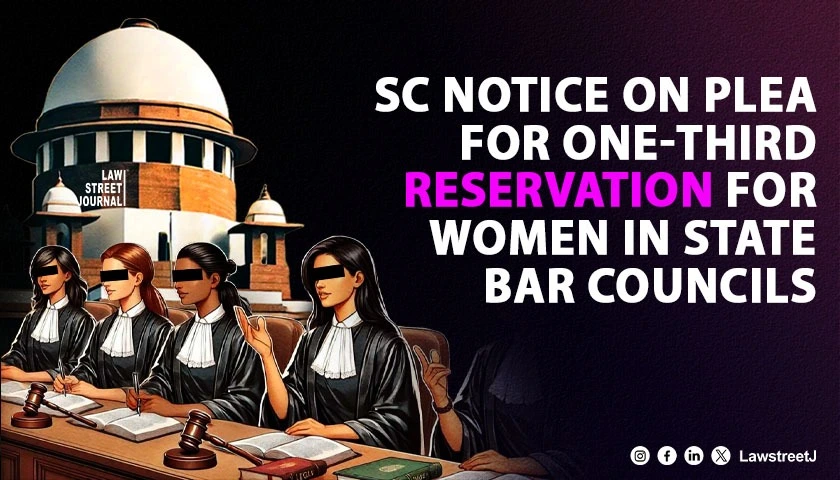New Delhi: The Supreme Court of India on Friday issued notice on a writ petition seeking the reservation of one-third of seats for women in all State Bar Councils across India, including at least one office-bearer post on a rotational basis.
The notice was issued by a Bench comprising Justice Surya Kant and Justice Joymalya Bagchi in the case of Shehla Chaudhary v. Union of India (W.P.(C) No. 1060/2025), with the matter scheduled for further consideration on November 17, 2025.
The petition was filed by advocate Shehla Chaudhary challenging the current composition of State Bar Councils, which the petitioner contends violates fundamental rights guaranteed under Articles 14, 15, 16, and 21 of the Constitution of India. The Union of India, the Bar Council of India, and all State Bar Councils have been arrayed as respondents in the petition.
The petitioner has argued that the principle of gender equality is enshrined in the Constitution of India through its Preamble, Fundamental Rights, Fundamental Duties, and the Directive Principles of State Policy. The petition states that “in the absence of women advocates being members of the State Bar Councils, women advocates continue to be deprived of opportunities to contribute to the legal profession in a meaningful way.”
The petition traces the historical struggle of women in the legal profession, highlighting that they were formally allowed to enter the legal field only after the enactment of the Legal Practitioners (Women) Act, 1923. Despite this milestone over a century ago, the petition contends that women remain severely underrepresented in Bar Council administration even today.
The petition presents stark statistics regarding women’s representation in State Bar Councils, noting that women constitute only 2.04% of elected representatives. Out of 441 members across all State Bar Councils, only nine are women. It further notes that several State Bar Councils — including those of Gujarat, Delhi, Maharashtra and Goa, Punjab and Haryana, Rajasthan, Uttar Pradesh, and West Bengal — have no women members at all.
The petitioner contends that the gross underrepresentation of women in State Bar Councils directly impacts policymaking in the legal profession and impedes the ability of these statutory bodies to address issues faced by women advocates. The petition states that “to safeguard the rights, privileges, and interests of advocates, it is necessary to have an in-depth understanding of the issues faced by advocates, including women advocates who face certain issues distinct from their male colleagues. In the absence of any woman’s representation in a State Bar Council, there is a severe impediment in addressing concerns pertaining to women advocates, thereby leaving no avenue for them to raise issues regarding their welfare.”
The petition argues that without women at the decision-making table, issues relating to workplace discrimination, harassment, maternity support, infrastructural needs, and safety remain unaddressed. It states that “time and again, women have managed to prove their worth as legal professionals, but the legal profession is still seen as a male-dominated area wherein issues concerning women advocates are rarely considered — one of the reasons being the negligible representation of women advocates in State Bar Councils and Bar Associations.”
The petition relies on the Supreme Court’s order dated May 2, 2024, wherein the Court directed that one-third of the seats in the Executive Committee of the Supreme Court Bar Association (SCBA), including one office-bearer post, be reserved for women. The petitioner seeks similar relief to be extended to all State Bar Councils across the country.
The petition further argues that Article 15(3) permits the State to make special provisions for women and notes that similar reservations already exist for women in Parliament, State Legislatures, Panchayati Raj Institutions, Municipalities, and Cooperative Societies. The petitioner contends that the absence of such representation in State Bar Councils stands in contrast to these existing constitutional and statutory provisions for women’s reservation.
The petition interprets Section 3(2)(b), read with Section 3(3) of the Advocates Act, 1961, as supporting a system of proportional representation that should extend to underrepresented classes, including women advocates. It argues that “the term ‘proportional representation’ as employed in the statute should be understood as requiring the inclusion of underrepresented classes of advocates.”
The petitioner has prayed for directions to reserve one-third of the seats for women in all State Bar Councils across India, including at least one office-bearer post on a rotational basis. The relief sought aims to ensure the meaningful participation of women advocates in shaping policies and addressing issues pertaining to the legal profession.
The Bench has issued notice to all respondents and listed the matter for hearing on November 17, 2025. The Court will examine whether the current composition of State Bar Councils violates constitutional mandates and whether reservation is necessary to ensure adequate representation of women in the governance of the legal profession.
Case Title: Shehla Chaudhary v. Union of India
Case No.: W.P.(C) No. 1060/2025
Coram: Justice Surya Kant and Justice Joymalya Bagchi
Date of Order: November 7, 2025
For Petitioner: Dr. Charu Mathur, Advocate
Petition Drafted by: Advocates Md. Anas Chaudhary and Alia Zaid
Filed Through: Advocate-on-Record Ansar Ahmad Chaudhary











